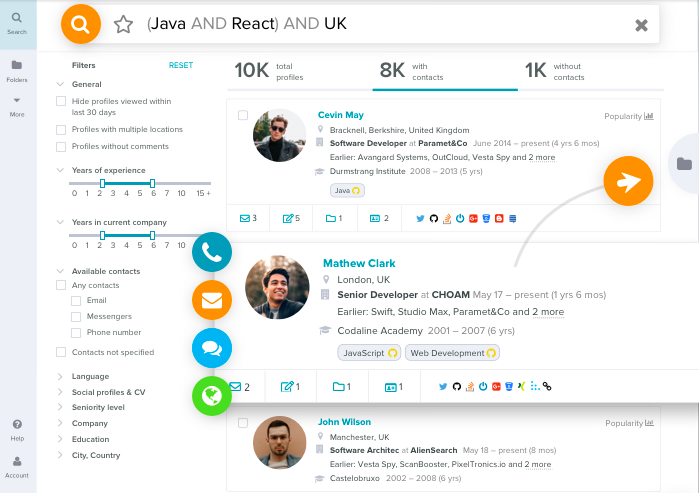Excited to share a very special sourcing guru interview! Tom Winter, the Co-Founder of Devskiller, revealed the secrets of screening, testing, and interviewing developers.
How did you come up with the idea of Devskiller? What is the mission behind it?
Have you ever tried Googling “technical hiring is broken”? Many of the stories you’ll find are hard to believe. The waters of technical recruitment are difficult to navigate and the relationship between recruiters and developers is a rocky one, to say the least.
Developers are inundated with recruiter mail and they’re fed up with shoddy technical screening attempts. Recruiters are tired of struggling to improve the quality of candidates they funnel to the dev team only to be criticized for their efforts. Both sides participating in the process are frustrated and unhappy with the end result.
We decided to bring a much-needed change to tech hiring by helping developers and recruiters finally cooperate. We do that in a number of ways.
First of all, we give them our tool. One of the biggest criticisms tech recruiters have to deal with is that they cannot deliver valuable candidates. Because the process is inefficient, these non-viable candidates have to be interviewed by developers who know they’re not a fit 5 minutes into the interview. This problem can be solved by moving technical screening to an earlier stage in the hiring process using an automated tool like our very own Devskiller. We believe that testing candidates should mirror the first day of work experience. We’ve devoted a lot of time working on our RealLifeTesting™ methodology to ensure that tech candidates are given a fair chance to showcase their real coding skills under realistic conditions.
Second of all, we provide educational resources to help technical recruiters better themselves. To put it mildly, developers don’t have much respect for recruiters who think Java and JavaScript are the same things. They want to be approached by people who know what they’re talking about. Yegor Bugayenko, an excellent software engineer wrote a post “You’re Just the Mayonnaise in a Bad Sandwich” which pretty much sums up the feelings some devs have towards recruiters. We want to help recruiters steer away from bad recruitment practices leading to even more frustration.
To do that, we give recruiters educational resources like our free Tech Recruitment Certification Course, ebooks, cheat sheets, and other support materials to maximize their chances of providing great candidates. Being a technical recruiter is a really tall task and we’re trying to make it a little bit easier.
What is special about the assessment of technical talent?
I’d say it’s tricky because most of the time, technical recruiters cannot verify the tech skills necessary to do well in a given job.
Developers are frustrated about being screened by non-technical staff, either through yes/no questions or through what is often called whiteboard hazing. Some companies ask their candidates to solve algorithmic puzzles or invert binary trees. They also don’t allow them to use any resources while being tested. I think assessing technical talent should be based on what you can do and not what you know off the top of your head. I believe the ways of technical screening mentioned above are flawed because they aren’t parallel to real work challenges. According to Frederick D. Smith, work sample tests have high predictive validities and I believe that when it comes to screening technical skills, work sample tests really are the way forward.
Why is it important to test candidates’ technical skills on the screening stage of the recruitment process?
I believe the initial stages of the recruitment process have an immense impact on the final outcome. In other words, if your sourcing and technical screening procedure are inefficient, you’re unlikely to hire great developers.
The earlier you screen technical skills, the better. Our customers see a tremendous difference in the number of technical interviews they need to carry out in order to hire a developer. As an example, a Gothenburg-based technical recruitment agency called Lingonberry Talent Acquisition used to interview 15 developers to make 2 technical hires. By screening their candidates’ coding skills with our tool early in the process, they now only have 4 technical interviews per 2 developers hired. Today, they only interview 11.43% of all candidates as opposed to 21.43% before implementing Devskiller.
Lingonberry’s numbers show you just how important it is to screen out the bad candidates from your recruitment process early on. If you don’t, you’ll keep wasting your precious time.
What are the components of an efficient assessment process?
Technical skill assessment should be automated and should happen early in the process. It should also be supported by means of benchmarks. We typically recommend that one of our customer’s internal developers take the test so that they have a valid benchmark. If that’s not possible, we also have the AI Benchmarking Engine which predicts the likelihood of success for every single candidate.
What is the biggest challenge in testing technical specialists?
I think testing technical skills efficiently translates itself to the employer brand of a company. If the screening process is inefficient or the recruiter seems to lack the required skills, the whole company risks being seen as an undesirable workplace. What is more, the popularity of social media, review sites, and forums means mistakes only a few people would normally see get blown up as if they were put under a magnifying glass. Oftentimes, the most vocal critics are really good developers who don’t come in with a vendetta but feel they need to share how flawed the system is.
How do you attract developers to contribute to your tasks base?
Luckily, the developers we work with see value in what we do and we’re happy with the results of our cooperation. We keep our tasks secure by using social listening tools and our own proprietary content scanner so our tasks stay secure. This shows our contributors that we value their work and want to keep using it as long as we possibly can.
What is more, they’ve had similar experiences with the technical recruitment process and they enjoy creating tasks that really verify coding skills.
You offer various methods to assess the technical skills of the candidate. In what cases each one of them is more relevant?
We see the best results when using a combination of tasks, depending on the skillsets you need to verify. As an example, multiple-choice questions are often used at the beginning of the test as a warm-up. Coding review challenges verify familiarity with design patterns and coding practices, and programming tasks allow you to see how candidates solve real coding challenges in a real project environment. All these tasks serve their own purpose and they get selected or not depending on the required skillset.
 Finding this article insightful?
Top Recruiters create content for AmazingHiring.
Subscribe to receive 1 curated newsletter per month with our latest blog posts.
Finding this article insightful?
Top Recruiters create content for AmazingHiring.
Subscribe to receive 1 curated newsletter per month with our latest blog posts.

80% of Tech candidates are passive.
Level up your outbound sourcing strategy.Ready to start sourcing IT candidates?
AmazingHiring is an AI-based aggregator to source passive IT candidates across the web. It finds people profiles from 50+ networks like GitHub, StackOverflow, Facebook, Kaggle, etc. and provides recruiters with candidates’ professional background, contacts, social footprint.
#1 Playbook: The Ultimate Guide to Sourcing on Social Media
Subscribe to AmazingHiring’s sourcing newsletter and get the #1 Playbook: The Ultimate Guide to Sourcing on Social Media
In this playbook, we speak about sourcing techniques and hacks for different social networks where you can find developers, software engineers, UX designers, DevOps, etc. Our experts share their step-by-step guide on how to build boolean searches and how to filter candidates. The playbook will be useful to recruiters who: want to make the most […]
Disclaimer: The article is created based on materials provided by Yves Greijn, Lead Engineering Sourcer (ex-QuantumBlack, now Miro), Neha Naik, CEO of recruitgyan.com, and Monika Nemcova (AIHR, ex-Content Marketer from harver.com) How do you measure your recruiting success? We have prepared an ultimate list of recruiting & sourcing metrics to be checked regularly. All metrics formulas can […]
Hiring the right employees can elevate your business to new standards. But finding the right employees or candidates is not always easy. Many applicants have vast experiences and backgrounds, but not all may fit well within your company. This is why you need a tech recruiting strategy to cut through the noise and find the […]








